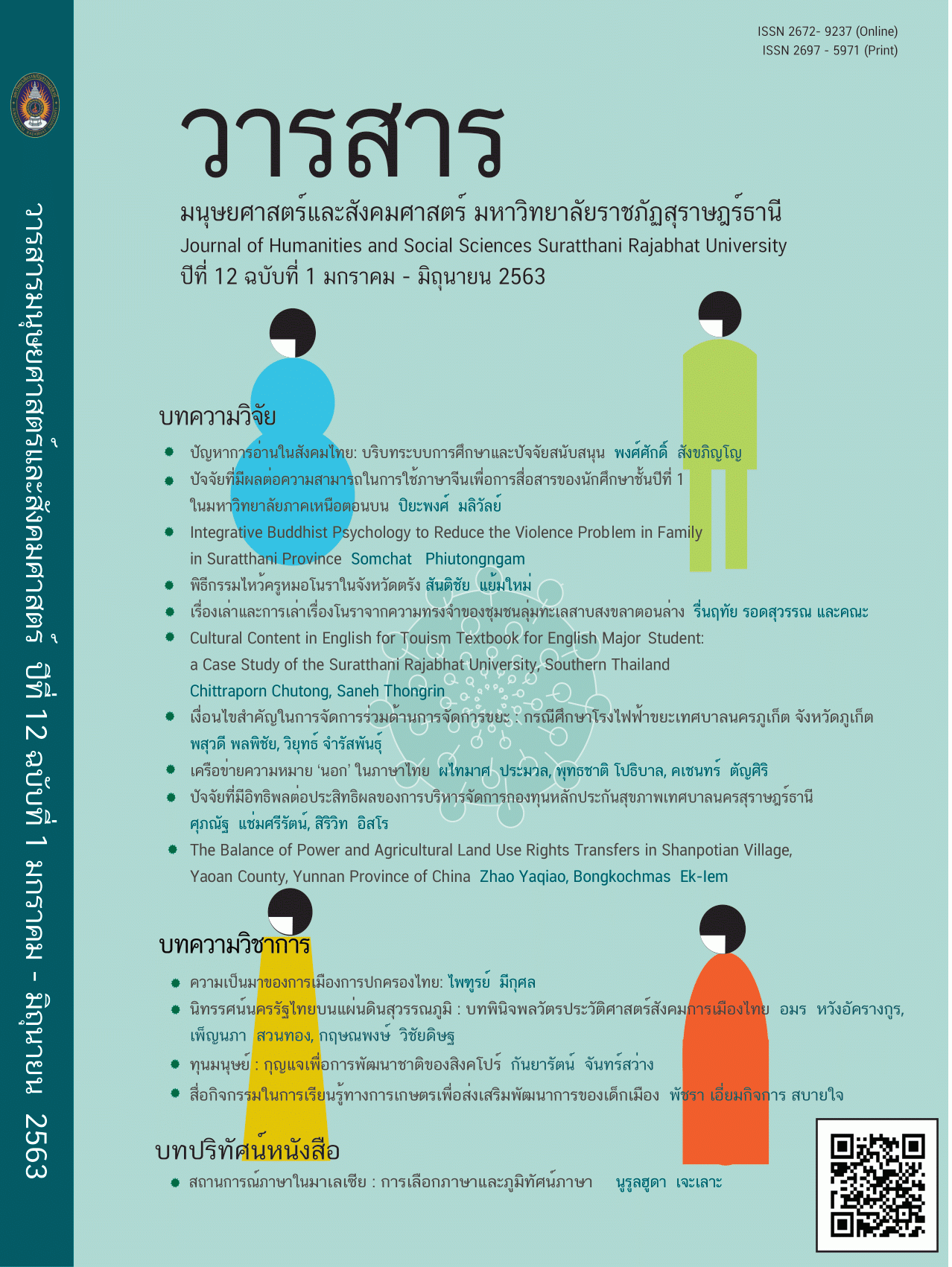The Balance of Power and Agricultural Land Use Rights Transfer in Shanpotian Village, Yaoan County, Yunnan Province of China
Main Article Content
Abstract
The objectives of this research are (1) to understand the powerrelations and negotiations, and the balance of power relations in theagricultural land-use rights transfer process over the past 10 years inShanpotian village in Yaoan county, Yunnan province, and (2) to propose anappropriate model for the balance of power relations in agriculturalland-use rights transfer for sustainable agricultural land use. A qualitative methodology is utilized. Focus group discussions and in-depth interviews with 45 farmers were implemented. The results of the study show that the agricultural land-use rights transfer process is neither a neutral nor a
peaceful process; powerful groups will attempt to formally and informally use their socioeconomic powers to influence the transfer process to gain more benefits from the negotiation. The poor will always be losers and gain fewer public interests. For balancing power relations, the government must represent the interests of poor farmers and the public, which is vital for controlling market force. Moreover, the third-party monitoring systems should be established during and after the agricultural land use rights
transfer process to assure that appropriate land use is in practice.
Article Details

This work is licensed under a Creative Commons Attribution-NonCommercial-NoDerivatives 4.0 International License.
All published manuscripts have been verified by peer-peer professors in the fields of humanities and social sciences. Reprinting of the article must be authorized by the editorial staff.
References
Chinese Agricultural Law. (2000). Chinese Science Press: 2000, Beijing, China.
Dahl, A. R. (1961). Who Governs. Yale University: New Haven, CT, USA.
Foucault, M. (1975). Discipline and Punish. University of Tunis: Tunis, Tunisia.
Gaventa, J. (1980). Power and Powerlessness: Quiescence and Rebellion in
an Appalachian Valley. Oxford: Oxford University Press, 22.
Giddens, A.(1973). The Class Structure of the Advanced Societies. Hutchin
son: London, UK.
Hanjun. (1995). The Rural Reform in China. Chinese Rural Economy. Volume
,Beijing, China.
Mou,Y. (2006). The Negative Impact of Agricultural Land Right Transfer. The
Chinese Rural Reform: 2006. Beijing, China, Volume7.
Shanpotian Village Statistics. (2017). Shanpotian Village Committee
Publication: 2017.
Weber, M. Parsons T., Henderson A. M. (1947). The Theory of Social and
Economic Organization. Oxford: Oxford University Press.
Interviews
Li (Interviewee). Fu Xiran (Interviewer). at Shanpotian Village, Yaoan
County, Yunnan Province, China. On 22nd June 2017.
Lui (Interviewee) Fu Xiran (Interviewer). at Shanpotian Village, Yaoan
County, Yunnan Province, China. On 21st June 2017.
Liu, Jiang, Li, Fu, Shang, and Yang (Interviewees) Zhao Yaqiao
(Interviewer). at Shanpotian Village, Yaoan County,
Yunnan Province, China. On 27th–29th June 2017).
Wang (Town Government Officer) (Interviewee) Zhao Yaqiao
(Interviewer). at Shanpotian Village, Yaoan County, Yunnan Province,
China. On 10th June 2017.
Zhang (Town Government Officer) (Interviewee) Zhao Yaqiao
(Interviewer). at Shanpotian Village, Yaoan County, Yunnan Province,
China. On 10th June 2017.
Zhou (Interviewee) Zhao Yaqiao (Interviewer). at Shanpotian Village,
Yaoan County, Yunnan Province, China. On 10th June 2017.


